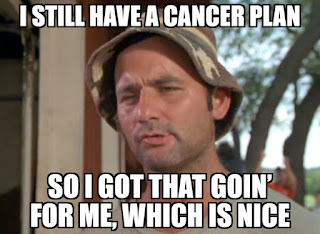The New Year has begun! Happy New Year to all and good riddance to 2020!
A few nights ago there was a primetime special on one of broadcast networks with a recap of 2020. The bulk of it was a chronological look at the Covid pandemic and how people and our leaders were reacting to it all. After watching about 15 minutes of this I had to change the channel to a ballgame thinking to myself, "I don't want to relive that again. And who doesn't know this stuff at point?" It was bad when it was happening and it still is bad in the rear view mirror.
And that is where 2020 needs to be, in the rear view. There is no need in dissecting it and examining it under a microscope. We were all there and saw it firsthand.
Through it all a few good things did happen. Most of us have a newfound respect for our medical community, especially those nurses and doctors who have been doing their best in overcrowded hospitals. I would be remiss if I didn't mention the caregivers in nursing and assisted living facilities too. These folks have poured their blood, sweat and tears into their work, with some getting infected themselves. And a few have died in the process. We should be thankful for them and their efforts.Others should also be considered in the same vein. Grocery store workers, meat workers and others who help us get food on our tables should know they are more than "essential".
Yes, there have been some silver linings. People have learned how to get together when they can't be together, via virtual technology. We have adapted and overcome. Like they say, "what doesn't kill you will make you stronger." We as a society should come out of all of this stronger.
Speaking on behalf of myself and our network of agents at Surf Financial Brokers, I want to thank all of our clients who kept us going all year. Your faith in us to help with securing your financial goals is greatly appreciated. And to those of you who referred us, shared our information and even laughed at some of the dumb memes we shared, I say thank you.
Insurance is a tough business. It's the only product I can think of that people buy in hopes of never having to use. Fortunately, there are those who understand and appreciate that bad things happen in life, and when those things occur, you can shift the responsibility to an insurance company. That's what our business is all about.
Part of the optimism we have is due to the upgrades we have made to our business. Going "virtual" has meant implementing some different tools, especially on our website. The goal of our agency is to make it as easy as possible for our clients to find information they need on life insurance, disability insurance and long term care, along with cancer, accident and other ancillary insurance plans. We have even added quoting tools that an individual can use to find a plan in their budget.
To make the process even easier we have even added our calendar to our website. When someone books a time for a phone appointment that works for their schedule, they can also let us know what they want to talk about. We have had some people say that buying an insurance policy from us was one much easier than expected.
So as we look forward (instead of backwards) to a New Year, we hope that we will be hearing from you. Again, thank you for all of your referrals and I hope that your 2021 is the best year ever!
Chris Castanes is the president of Surf Financial Brokers, helping people find affordable life and disability insurance coverage. He's also is a professional speaker helping sales people be more productive and efficient and has spoken to professional and civic organizations throughout the Southeast. And please subscribe to this blog!










